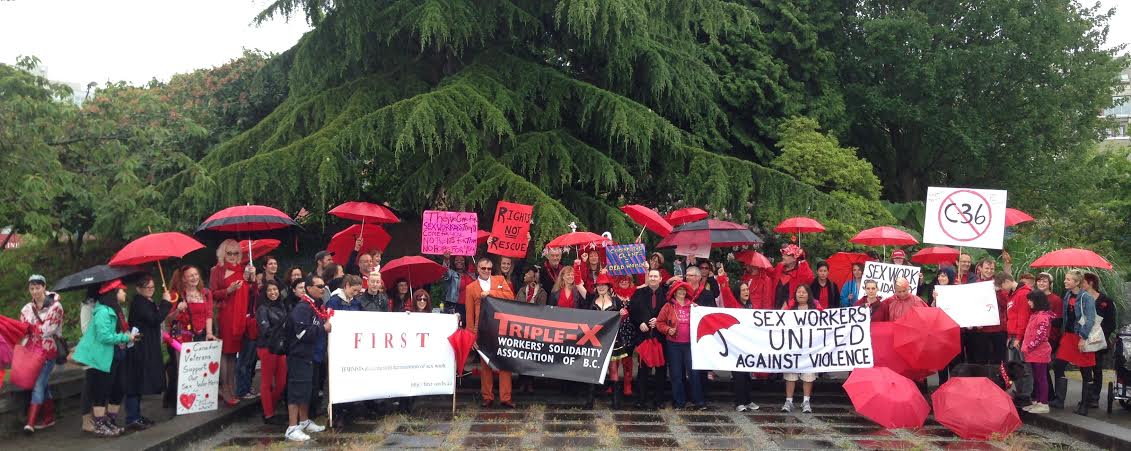By Maggie de Vries
December 17 is the International Day to End Violence Against Sex Workers. In dozens of cities all over the world, people get out their red umbrellas and gather to show their support for sex workers’ rights and to remember those who have lost their lives. World-over, the movement is gathering force. New Zealand decriminalized sex work in 2003; parts of Australia are following close behind.
Sadly, in Canada, we have a different story to tell. One year ago, Canadian sex workers and sex-worker-rights activists rejoiced when the Supreme Court struck down our then laws around sex work because they violated the Charter by threatening sex workers’ rights to life, liberty and security of the person. Specifically, they struck down the ban on keeping or being in a “bawdy house” or brothel, the ban on “living on the avails of prostitution,” and the ban on communicating in public for the purposes of prostitution. At that time, Canada had a chance to move into a place of decreased stigma, greater safety and more choice for sex workers.
Instead, our government came up with Bill C36, the “Protection of the Community and Exploited Persons Act,” a set of laws that came into effect on December 6, 2014 and are already driving sex work even farther into the shadows. It is now illegal to pay for sexual services, to discuss the sale of sex in certain areas, to receive a financial benefit knowing that it comes from the sale of sexual services, and to knowingly advertise an offer to sell sexual services.
It will likely take years to successfully challenge this Bill; in the meantime, the stigma will stay in place and the violence will continue.
For stigmatized and criminalized people living on society’s margins, health care experiences tend to be traumatizing. My sister, Sarah, lived on Vancouver’s downtown eastside for the last nine years of her life. She disappeared in 1998 and her DNA was found on serial murderer Robert Pickton’s property in 2002. At the time of her death, Sarah had been selling sex for half her life; she had been addicted to heroin and cocaine for years, and she was HIV positive and had hepatitis C. Too many times, when Sarah had no choice but to seek medical attention, she came away feeling diminished by the encounter, society’s judgements reinforced. On each of those occasions, an opportunity was lost. Sarah was stigmatized for her addiction along with her sex work. Often, when she was badly hurt and needed help, she didn’t seek medical attention at all.
We are working to sweep away the stigma and to challenge the laws once again. Get out your red umbrella and join us on Wednesday, December 17, at 5:30, in the Concourse at the Vancouver Public Library on Robson Street. On this International Day to End Violence Against Sex Workers we hope to find renewed strength, new allies and innovative ways to work together and find solutions to deal with the complex social, health and legal issues faced by sex workers. Freedom from violence, discrimination and stigma are key factors to promote health for everyone.

(Photo by Ester Shannon)
Here’s are links to the event on Facebook and my TEDxSFU talk on the subject: The Red Umbrella: Sex Work, Stigma and the Law.
Hope to see you there!
If you have questions, you can reach me at maggiedevries@shaw.ca.
Maggie de Vries, Author & Advocate
